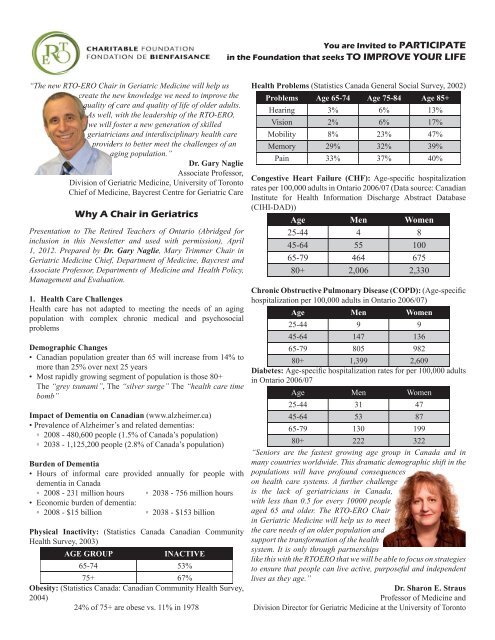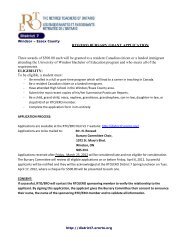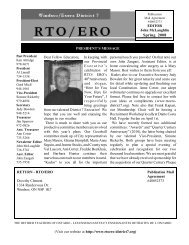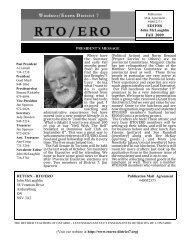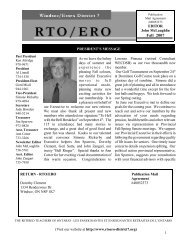Why A Chair in Geriatrics - RTO/ERO District 7 Windsor-Essex
Why A Chair in Geriatrics - RTO/ERO District 7 Windsor-Essex
Why A Chair in Geriatrics - RTO/ERO District 7 Windsor-Essex
You also want an ePaper? Increase the reach of your titles
YUMPU automatically turns print PDFs into web optimized ePapers that Google loves.
You are Invited to PARTICIPATE<br />
<strong>in</strong> the Foundation that seeks TO IMPROVE YOUR LIFE<br />
“The new <strong>RTO</strong>-<strong>ERO</strong> <strong>Chair</strong> <strong>in</strong> Geriatric Medic<strong>in</strong>e will help us<br />
create the new knowledge we need to improve the<br />
quality of<br />
care and quality of life of older adults.<br />
As<br />
well, with the leadership of the <strong>RTO</strong>-<strong>ERO</strong>,<br />
we will foster a new generation of skilled<br />
geriatricians and <strong>in</strong>terdiscipl<strong>in</strong>ary health care<br />
providers to better meet the challenges of an<br />
ag<strong>in</strong>g population.”<br />
Dr. Gary Naglie<br />
Associate Professor,<br />
Division of Geriatric Medic<strong>in</strong>e, University of Toronto<br />
Chief of Medic<strong>in</strong>e, Baycrest Centre for Geriatric Care<br />
<strong>Why</strong> A <strong>Chair</strong> <strong>in</strong> <strong>Geriatrics</strong><br />
Presentation to The Retired Teachers of Ontario (Abridged for<br />
<strong>in</strong>clusion <strong>in</strong> this Newsletter and used with permission), April<br />
1, 2012. Prepared by Dr. Gary Naglie, Mary Trimmer <strong>Chair</strong> <strong>in</strong><br />
Geriatric Medic<strong>in</strong>e Chief, Department of Medic<strong>in</strong>e, Baycrest and<br />
Associate Professor, Departments of Medic<strong>in</strong>e and Health Policy,<br />
Management and Evaluation.<br />
1. Health Care Challenges<br />
Health care has not adapted to meet<strong>in</strong>g the needs of an ag<strong>in</strong>g<br />
population with complex chronic medical and psychosocial<br />
problems<br />
Demographic Changes<br />
• Canadian population greater than 65 will <strong>in</strong>crease from 14% to<br />
more than 25% over next 25 years<br />
• Most rapidly grow<strong>in</strong>g segment of population is those 80+<br />
The “grey tsunami”, The “silver surge” The “health care time<br />
bomb”<br />
Impact of Dementia on Canadian (www.alzheimer.ca)<br />
• Prevalence of Alzheimer’s and related dementias:<br />
◦ 2008 - 480,600 people (1.5% of Canada’s population)<br />
◦ 2038 - 1,125,200 people (2.8% of Canada’s population)<br />
Burden of Dementia<br />
• Hours of <strong>in</strong>formal care provided annually for people with<br />
dementia <strong>in</strong> Canada<br />
◦ 2008 - 231 million hours<br />
• Economic burden of dementia:<br />
◦ 2008 - $15 billion<br />
◦ 2038 - 756 million hours<br />
◦ 2038 - $153 billion<br />
Physical Inactivity: (Statistics Canada Canadian Community<br />
Health Survey, 2003)<br />
AGE GROUP<br />
INACTIVE<br />
65-74 53%<br />
75+ 67%<br />
Obesity: (Statistics Canada: Canadian Community Health Survey,<br />
2004)<br />
24% of 75+ are obese vs. 11% <strong>in</strong> 1978<br />
Health Problems (Statistics Canada General Social Survey, 2002)<br />
Problems Age 65-74 Age 75-84 Age 85+<br />
Hear<strong>in</strong>g 3% 6% 13%<br />
Vision 2% 6% 17%<br />
Mobility 8% 23% 47%<br />
Memory 29% 32% 39%<br />
Pa<strong>in</strong> 33% 37% 40%<br />
Congestive Heart Failure (CHF): Age-specific hospitalization<br />
rates per 100,000 adults <strong>in</strong> Ontario 2006/07 (Data source: Canadian<br />
Institute for Health Information Discharge Abstract Database<br />
(CIHI-DAD))<br />
Age Men Women<br />
25-44 4 8<br />
45-64 55 100<br />
65-79 464 675<br />
80+ 2,006 2,330<br />
Chronic Obstructive Pulmonary Disease (COPD): (Age-specific<br />
hospitalization per 100,000 adults <strong>in</strong> Ontario 2006/07)<br />
Age Men Women<br />
25-44 9 9<br />
45-64 147 136<br />
65-79 805 982<br />
80+ 1,399 2,609<br />
Diabetes: Age-specific hospitalization rates for per 100,000 adults<br />
<strong>in</strong> Ontario 2006/07<br />
Age Men Women<br />
25-44 31 47<br />
45-64 53 87<br />
65-79 130 199<br />
80+ 222 322<br />
“Seniors are the fastest grow<strong>in</strong>g age group <strong>in</strong> Canada and <strong>in</strong><br />
many countries worldwide. This dramatic demographic shift <strong>in</strong> the<br />
populations will have profound consequences<br />
on health care systems. A further challenge<br />
is the lack of geriatricians <strong>in</strong> Canada,<br />
with less than 0.5 for every 10000 people pl<br />
e<br />
aged 65 and older. The <strong>RTO</strong>-<strong>ERO</strong> <strong>Chair</strong><br />
<strong>in</strong> Geriatric Medic<strong>in</strong>e will help us to meet<br />
the care needs of an older population and<br />
support the transformation of the health<br />
system. It is only through partnerships<br />
like this with the <strong>RTO</strong><strong>ERO</strong> that we will be able to focus on strategies<br />
to ensure that people can live active, purposeful and <strong>in</strong>dependent<br />
lives as they age.”<br />
Dr. Sharon E. Straus<br />
Professor of Medic<strong>in</strong>e and<br />
Division Director for Geriatric Medic<strong>in</strong>e at the University of Toronto
Disability<br />
In a group of 70 year olds who were <strong>in</strong>itially <strong>in</strong>dependent and<br />
were followed until death, 83% required help from another<br />
person <strong>in</strong> basic activities <strong>in</strong> their last year of life (TM Gill. NEJM<br />
2010;362:1173-1180).<br />
Need<strong>in</strong>g Help for Daily Activities (Statistics Canada: Canadian<br />
Community Health Survey, 2003)<br />
• In persons 75+<br />
◦ 25% need help with housework<br />
◦ 13% need help prepar<strong>in</strong>g meals<br />
◦ 10% need help with personal care<br />
Top 10 conditions associated with severe basic activity<br />
limitations: OECD, 2007<br />
1. Arthritis 4. Heart disease<br />
2. Hear<strong>in</strong>g disorders 5. Stroke<br />
3. Hypertension<br />
Disability is a common feature at the end of life<br />
• about 4 years for women • about 2 years for men<br />
Health Care Goals<br />
• Reduce years liv<strong>in</strong>g with disability at the end of life and maximize<br />
quality of life <strong>in</strong> those liv<strong>in</strong>g with disability<br />
• Combat stereotypes, myths about ag<strong>in</strong>g and ageism<br />
• Promote healthy lifestyle choices and disease and disability<br />
prevention<br />
2. Geriatric Medic<strong>in</strong>e<br />
The aim is “to add life to years, not just years to life”. (V.<br />
Korenchevsky. BMJ 1946)<br />
• Specialized care for older adults with complex medical and<br />
psychosocial needs<br />
• Holistic vs. disease or organ-based approach - help people<br />
achieve fullest potential<br />
• Role model for <strong>in</strong>terdiscipl<strong>in</strong>ary team care -nurses, physical<br />
therapists, occupational therapists, social workers, pharmacists,<br />
dieticians, others<br />
• Educate the next generation of health care professionals about<br />
how to care for the elderly<br />
• Provide education and support to older adults and family and<br />
professional caregivers<br />
• Conduct research to generate new knowledge<br />
• Advocate for health care for the elderly<br />
• Shortage of geriatricians (230 geriatricians <strong>in</strong> Canada, 500 <strong>in</strong><br />
Sweden, 1000 <strong>in</strong> UK)<br />
• Recruitment of tra<strong>in</strong>ees is challeng<strong>in</strong>g<br />
Role of Researchers and Academic Institutions<br />
• Help better understand the factors that contribute to disability <strong>in</strong><br />
old age<br />
• Develop and evaluate <strong>in</strong>novative technologies and <strong>in</strong>terventions<br />
and new, <strong>in</strong>tegrated models of care to prevent disability and<br />
enhance quality of life <strong>in</strong> older adults and to support family<br />
caregivers<br />
• Rapidly translate new knowledge to best practices<br />
• Educate professional and <strong>in</strong>formal caregivers of the future<br />
3. What is a <strong>Chair</strong><br />
• A chair (professorship) is a position permanently paid for by<br />
<strong>in</strong>come from an endowment fund established by a gift or gifts<br />
from private sources and is made available to a dist<strong>in</strong>guished<br />
faculty member <strong>in</strong> support of her/his teach<strong>in</strong>g, research and<br />
service activities.<br />
• Hold<strong>in</strong>g a chair is considered to be a major honour <strong>in</strong> the<br />
academic world.<br />
History of Endowed <strong>Chair</strong>s<br />
• The earliest “endowed chairs” were those established by the<br />
Roman emperor and Stoic philosopher Marcus Aurelius <strong>in</strong><br />
Athens <strong>in</strong> AD 176.<br />
• Aurelius created one endowed chair for each of the major<br />
schools of philosophy: Platonism, Aristotelianism, Stoicism, and<br />
Epicureanism.<br />
• Later, similar endowments were set up <strong>in</strong> some other major cities<br />
of the Empire.<br />
• The practice was adapted to the modern university system<br />
beg<strong>in</strong>n<strong>in</strong>g <strong>in</strong> England <strong>in</strong> 1502.<br />
• Lady Margaret Beaufort, Countess of Richmond and grandmother<br />
to the future K<strong>in</strong>g Henry VIII, created the first endowed chairs <strong>in</strong><br />
div<strong>in</strong>ity at the universities of Oxford and Cambridge.<br />
• Private <strong>in</strong>dividuals later adopted the practice of endow<strong>in</strong>g<br />
professorships.<br />
• Isaac Newton held the Lucasian <strong>Chair</strong> of Mathematics at<br />
Cambridge beg<strong>in</strong>n<strong>in</strong>g <strong>in</strong> 1669.<br />
• The Lucasian <strong>Chair</strong> was more recently held by the celebrated<br />
physicist Stephen Hawk<strong>in</strong>g.<br />
<strong>Why</strong> are <strong>Chair</strong>s Important<br />
• The university can use chairs to attract, recognize and reta<strong>in</strong> top<br />
professors who are acknowledged by their peers as be<strong>in</strong>g preem<strong>in</strong>ent<br />
<strong>in</strong> their fields<br />
• <strong>Chair</strong>s strengthen the tra<strong>in</strong><strong>in</strong>g of highly qualified personnel to<br />
improve the capacity of universities to generate and apply new<br />
knowledge<br />
• <strong>Chair</strong>s help universities achieve the highest levels of research<br />
excellence and to become world-class centres of research<br />
Benefits of a <strong>Chair</strong><br />
• Provides long term assured fund<strong>in</strong>g<br />
• Develops cadre of experts over time<br />
• Most effective way to impact research and education <strong>in</strong> a specific<br />
area<br />
Orchestra Analogy<br />
• Private funds to attract a world lead<strong>in</strong>g conductor<br />
• World lead<strong>in</strong>g conductor attracts new highly skilled members of<br />
the orchestra<br />
• Highly skilled conductor and orchestra attract large audience<br />
<strong>Chair</strong>s <strong>in</strong> Geriatric Medic<strong>in</strong>e<br />
• Only one <strong>Chair</strong> <strong>in</strong> Geriatric Medic<strong>in</strong>e at University of Toronto <strong>in</strong><br />
last 10 years<br />
• Only a handful of <strong>Chair</strong>s <strong>in</strong> Geriatric Medic<strong>in</strong>e across the country<br />
Impact of <strong>RTO</strong>/<strong>ERO</strong> <strong>Chair</strong><br />
<strong>in</strong> Geriatric Medic<strong>in</strong>e<br />
• An <strong>RTO</strong>/<strong>ERO</strong> <strong>Chair</strong> will<br />
dramatically <strong>in</strong>crease<br />
productivity <strong>in</strong> ag<strong>in</strong>g<br />
research and education.<br />
• An <strong>RTO</strong>/<strong>ERO</strong> <strong>Chair</strong> will<br />
lend academic credibility
thereby help<strong>in</strong>g to recruit young people to the field of geriatrics.<br />
• An <strong>RTO</strong>/<strong>ERO</strong> <strong>Chair</strong> would have national and <strong>in</strong>ternational<br />
impact.<br />
How the <strong>RTO</strong>/<strong>ERO</strong> <strong>Chair</strong> Operates<br />
The follow<strong>in</strong>g material has been prepared by <strong>RTO</strong>/<strong>ERO</strong>, the<br />
<strong>RTO</strong>/<strong>ERO</strong> Charitable Foundation and the University of Toronto<br />
to describe how the <strong>RTO</strong>/<strong>ERO</strong> <strong>Chair</strong> <strong>in</strong> Geriatric Medic<strong>in</strong>e will<br />
function. It was orig<strong>in</strong>ally produced after an agreement was<br />
reached between all parties and is used with permission. For<br />
further <strong>in</strong>formation, please contact Alanna Jones, CFRE, Director<br />
of Advancement & Fundrais<strong>in</strong>g, <strong>RTO</strong>/<strong>ERO</strong> Charitable Foundation,<br />
1•800• 361•9888, or 416•962•9463 ext. 245, or ajones@ero-rto.<br />
org.<br />
The Retired Teachers of Ontario<br />
<strong>Chair</strong> <strong>in</strong> Geriatric Medic<strong>in</strong>e<br />
Executive Summary<br />
We live <strong>in</strong> an era of vastly expand<strong>in</strong>g opportunities and <strong>in</strong>creas<strong>in</strong>gly<br />
formidable challenges <strong>in</strong> the fields of health and ag<strong>in</strong>g. The tools,<br />
technologies and <strong>in</strong>sights of medical science be<strong>in</strong>g developed<br />
daily at the University of Toronto are rapidly expand<strong>in</strong>g our<br />
understand<strong>in</strong>g of human health, reveal<strong>in</strong>g the fundamental causes<br />
of disease, revolutioniz<strong>in</strong>g the delivery of care and educat<strong>in</strong>g<br />
tomorrow’s leaders.<br />
As a result of a dramatic population shift, Canada will face the<br />
complex medical needs of an <strong>in</strong>creas<strong>in</strong>gly ag<strong>in</strong>g population who<br />
are liv<strong>in</strong>g longer, often with one or more chronic conditions.<br />
Today, about 15% of Canadians are over 65 years old — and<br />
this is expected to <strong>in</strong>crease to over 25% <strong>in</strong> the next 25 years.<br />
Furthermore, the most rapidly grow<strong>in</strong>g segment of our population<br />
is the oldest age group, i.e. those aged 80 and older. This “silver<br />
tsunami” will pose a set of serious challenges to our health care<br />
system.<br />
Unless these challenges are addressed, older Canadians will not<br />
enjoy the quality of life all Canadians deserve. To meet this goal,<br />
<strong>in</strong>ter-professional education, research and cl<strong>in</strong>ical practice focused<br />
on enhanc<strong>in</strong>g communication and collaboration is essential. We<br />
need to tra<strong>in</strong> many more geriatrics specialists and we need to<br />
dramatically <strong>in</strong>crease research <strong>in</strong> the field.<br />
The University of Toronto is poised to lead the drive for growth,<br />
<strong>in</strong>novation and hope for the field of geriatrics. Inspired by a<br />
legacy of excellence and build<strong>in</strong>g on our capacity for outstand<strong>in</strong>g<br />
<strong>in</strong>novation and discovery, the Division of Geriatric Medic<strong>in</strong>e has<br />
a bold plan to become a global agent for change <strong>in</strong> research and<br />
education.<br />
We envision a day when all seniors live <strong>in</strong> dignity and<br />
<strong>in</strong>dependence as valued, healthy, functional and engaged citizens.<br />
Our research will yield key <strong>in</strong>sights <strong>in</strong>to human ag<strong>in</strong>g, redef<strong>in</strong><strong>in</strong>g<br />
our understand<strong>in</strong>g of the long-term health of <strong>in</strong>dividuals, societies<br />
and the care of older people.<br />
We gratefully thank The Retired Teachers of Ontario/les<br />
Enseignantes et Enseignants<br />
Retraités de l’Ontario<br />
(<strong>RTO</strong><strong>ERO</strong>) for their leadership<br />
role <strong>in</strong> help<strong>in</strong>g to ma<strong>in</strong>ta<strong>in</strong><br />
the quality and dignity of the<br />
lives of older Canadians by<br />
committ<strong>in</strong>g to establish the<br />
Retired Teachers of Ontario<br />
<strong>Chair</strong> <strong>in</strong> Geriatric Medic<strong>in</strong>e.<br />
The Retired Teachers of Ontario <strong>Chair</strong> <strong>in</strong> Geriatric Medic<strong>in</strong>e:<br />
A New Vision to Meet the Chang<strong>in</strong>g Needs of Older Canadians<br />
At the heart of one of the strongest health science networks <strong>in</strong> the<br />
world, the University of Toronto is uniquely poised to lead a surge<br />
of knowledge and discovery <strong>in</strong> geriatric medic<strong>in</strong>e, and to br<strong>in</strong>g<br />
the benefits of research to people <strong>in</strong> Ontario, across Canada, and<br />
around the world.<br />
Through research, teach<strong>in</strong>g and partnerships with healthcare<br />
providers, the University of Toronto directly <strong>in</strong>forms the world’s<br />
standard of health and the realization of human potential<br />
everywhere.<br />
The Division of Geriatric Medic<strong>in</strong>e at the University of Toronto<br />
shares the concerns of the members of the <strong>RTO</strong>-<strong>ERO</strong> <strong>in</strong> the areas<br />
of health care and education on the issues affect<strong>in</strong>g seniors and<br />
older Canadians. We are proud to be the largest tra<strong>in</strong><strong>in</strong>g program <strong>in</strong><br />
geriatric medic<strong>in</strong>e <strong>in</strong> Canada, The Mary Trimmer <strong>Chair</strong> <strong>in</strong> Geriatric<br />
Medic<strong>in</strong>e and the George, Margaret and Gary Hunt Family <strong>Chair</strong> <strong>in</strong><br />
Geriatric Medic<strong>in</strong>e that currently exist at the University of Toronto,<br />
are among only a handful of such chairs <strong>in</strong> Canada.<br />
With the support of <strong>RTO</strong>-<strong>ERO</strong> we plan to further strengthen our<br />
position as an <strong>in</strong>ternational leader <strong>in</strong> geriatrics research and education<br />
— and to transform geriatric practice <strong>in</strong> Canada by establish<strong>in</strong>g a<br />
third chair <strong>in</strong> Geriatric Medic<strong>in</strong>e. This will allow us to:<br />
• Increase and leverage opportunities to access fund<strong>in</strong>g to support<br />
ongo<strong>in</strong>g research and education.<br />
• Increase public and research prestige for <strong>Chair</strong> partners and<br />
profile for the field of geriatric medic<strong>in</strong>e <strong>in</strong> Canada.<br />
Furthermore, the proposed <strong>Chair</strong> <strong>in</strong> Geriatric Medic<strong>in</strong>e will<br />
serve as a powerful recruit<strong>in</strong>g tool <strong>in</strong> the University’s efforts to<br />
attract and reta<strong>in</strong> the best and brightest <strong>in</strong>ternationally regarded<br />
practitioners.<br />
Our discoveries, <strong>in</strong> turn, will lead to new techniques and<br />
treatments, and ultimately, to improved quality of life for seniors<br />
and older Canadians.<br />
Established through contributions from <strong>RTO</strong>-<strong>ERO</strong> total<strong>in</strong>g<br />
$3,000,000, the endowed <strong>Chair</strong> will generate annual funds to<br />
support areas of excellence <strong>in</strong> education and research.<br />
This <strong>in</strong>come may be used at the discretion of the Faculty to:<br />
• Ensure long term benefit beyond Toronto and be widely<br />
collaborative among health science practitioners and across<br />
multiple discipl<strong>in</strong>es.<br />
• Build on the strong research accomplishments of the Division of<br />
Geriatric Medic<strong>in</strong>e with a focus on applied research.<br />
• Create evidence-based educational strategies for care of older<br />
persons.<br />
• Increase publication of research <strong>in</strong> relevant, high impact journals.<br />
• Increase peer reviewed fund<strong>in</strong>g of research projects.<br />
The <strong>RTO</strong>-<strong>ERO</strong> <strong>Chair</strong> <strong>in</strong> Geriatric Medic<strong>in</strong>e: Impact<br />
The University of Toronto is the fulcrum of one of the most vibrant<br />
biomedical research and education centres <strong>in</strong> the world. Through<br />
our partnership with 10 fully affiliated hospitals and research<br />
<strong>in</strong>stitutes and a network of 20 community-affiliated sites, a diverse,<br />
multi-discipl<strong>in</strong>ary community applies its talent to solv<strong>in</strong>g some of<br />
the most puzzl<strong>in</strong>g questions of human health and biology.<br />
The University is a magnet, draw<strong>in</strong>g <strong>in</strong> the best and brightest<br />
students from across Canada and around the world. We are<br />
the largest tra<strong>in</strong>er and educator of health care professionals<br />
<strong>in</strong> the country, annually graduat<strong>in</strong>g the most new physicians,<br />
rehabilitation professionals, biomedical science professionals
and specialists—each one expertly tra<strong>in</strong>ed to deal with an ag<strong>in</strong>g,<br />
chang<strong>in</strong>g population and employ<strong>in</strong>g the very latest techniques to<br />
improve the health of patients and families.<br />
The <strong>Chair</strong> <strong>in</strong> Geriatric Medic<strong>in</strong>e will result <strong>in</strong> a number of<br />
benefits for the <strong>RTO</strong>-<strong>ERO</strong>, University of Toronto researchers,<br />
cl<strong>in</strong>icians and students — and an improved quality of life for<br />
seniors and older Canadians.<br />
For the <strong>RTO</strong>-<strong>ERO</strong> stakeholder community, your <strong>in</strong>vestment will:<br />
• Recognize academic excellence and create a dramatically<br />
<strong>in</strong>creased legacy of applied research, and education.<br />
• Help the <strong>RTO</strong>-<strong>ERO</strong> to emerge as a passionate champion cutt<strong>in</strong>g<br />
across national and cultural differences <strong>in</strong> the creation of new<br />
knowledge about healthy ag<strong>in</strong>g.<br />
For Canadians, your <strong>in</strong>vestment will:<br />
• Act as a tangible way to help <strong>in</strong>crease research productivity and<br />
education <strong>in</strong> geriatric medic<strong>in</strong>e for the benefit of all.<br />
• Help ensure more ‘senior friendly’ health care, hospitals and<br />
communities.<br />
For the University of Toronto, your <strong>in</strong>vestment will:<br />
• Support the creation of new knowledge that will improve the<br />
quality of care and foster a new generation of skilled geriatricians<br />
and students.<br />
Global health care systems are fac<strong>in</strong>g an <strong>in</strong>creas<strong>in</strong>gly ag<strong>in</strong>g<br />
patient population and as a result, <strong>in</strong>creases <strong>in</strong> health care demands<br />
will threaten capacity and susta<strong>in</strong>ability.<br />
Together, we will advance knowledge about cost-effective and<br />
susta<strong>in</strong>able strategies for promot<strong>in</strong>g the care of older persons,<br />
ensur<strong>in</strong>g that seniors can age with dignity, <strong>in</strong>dependence and vitality.<br />
Recognition<br />
As a long recognized <strong>in</strong>ternational leader <strong>in</strong> education and research,<br />
the University of Toronto has an exceptional record of stewardship<br />
and accountability.<br />
To help protect aga<strong>in</strong>st <strong>in</strong>flation, gifts to the endowed Retired<br />
Teachers of Ontario <strong>Chair</strong> <strong>in</strong> Geriatric Medic<strong>in</strong>e will be <strong>in</strong>vested<br />
and a portion of the annual return re<strong>in</strong>vested to ensure the value of<br />
the capital is preserved.<br />
We would be pleased to offer the <strong>RTO</strong>-<strong>ERO</strong> a customized<br />
program of recognition that <strong>in</strong>cludes:<br />
• Nam<strong>in</strong>g of the Retired Teachers of Ontario <strong>Chair</strong> <strong>in</strong> Geriatric<br />
Medic<strong>in</strong>e <strong>in</strong> accordance with the University of Toronto policy<br />
on nam<strong>in</strong>g.<br />
• An announcement of your gift and the establishment of the <strong>Chair</strong><br />
<strong>in</strong> targeted media and Faculty publications.<br />
• An opportunity for <strong>RTO</strong>-<strong>ERO</strong> to host a member sem<strong>in</strong>ar featur<strong>in</strong>g<br />
the <strong>Chair</strong> holder and other researchers as speakers.<br />
• Recognition <strong>in</strong> the University of Toronto’s annual donor list<strong>in</strong>g<br />
and on the website of the Faculty of Medic<strong>in</strong>e.<br />
• An annual report from the <strong>Chair</strong><br />
holder and an annual report on the<br />
performance of your endowment.<br />
The Retired Teachers of<br />
Ontario has expressed its commitment<br />
to honour the contributions that seniors<br />
and older Canadians make to society.<br />
With the help of the <strong>RTO</strong>-<strong>ERO</strong> and<br />
this new <strong>Chair</strong> <strong>in</strong> Geriatric Medic<strong>in</strong>e,<br />
we can improve the quality of life<br />
of seniors and older Canadians for<br />
generations to come.<br />
Leadership <strong>in</strong> Geriatric Medic<strong>in</strong>e:<br />
Today and Tomorrow<br />
The Faculty of Medic<strong>in</strong>e is positioned<br />
<strong>in</strong> Canada’s biggest city at the nexus of<br />
one of the great biomedical research,<br />
education and cl<strong>in</strong>ical care centres <strong>in</strong><br />
the world. The Faculty is the dest<strong>in</strong>ation<br />
of choice for <strong>in</strong>creas<strong>in</strong>g numbers of<br />
Canadian and <strong>in</strong>ternational students<br />
look<strong>in</strong>g for a world class medical or<br />
health professional educational or<br />
tra<strong>in</strong><strong>in</strong>g experience. The quality of our<br />
programs, faculty, teach<strong>in</strong>g staff and<br />
the opportunities for <strong>in</strong>tegrated education available to students<br />
through our partnership <strong>in</strong> one of North America’s largest and most<br />
productive academic health centres, the Toronto Academic Health<br />
Science Network (TAHSN) – are unrivalled <strong>in</strong> Canada, and ranks<br />
us among the best medical faculties <strong>in</strong> the world.<br />
Canadians, <strong>in</strong> common with people of all other <strong>in</strong>dustrial nations,<br />
are liv<strong>in</strong>g longer than ever before. Adults 65 years and over now<br />
constitute the fastest grow<strong>in</strong>g population group <strong>in</strong> Canada. The<br />
ga<strong>in</strong>s <strong>in</strong> longevity are accompanied by <strong>in</strong>creased demand for health<br />
services, and also impact the type of services required.<br />
Stay<strong>in</strong>g healthy – which requires access to top quality healthcare<br />
when needed – is a priority for all ages, but particularly important<br />
as we grow older. Our Faculty produces most of the high priority<br />
specialists <strong>in</strong> Ontario and we tra<strong>in</strong> the largest proportion of highly<br />
specialized and emerg<strong>in</strong>g sub-specialty tra<strong>in</strong>ees <strong>in</strong> grow<strong>in</strong>g areas<br />
of demand, such as geriatrics, rheumatology and medical oncology,<br />
among others.<br />
In addition, the University of Toronto has the largest Geriatric<br />
Medic<strong>in</strong>e specialty tra<strong>in</strong><strong>in</strong>g program <strong>in</strong> Canada with 18 full time<br />
and 12 part time Geriatric Medic<strong>in</strong>e faculty. The applied research<br />
program is focused on cl<strong>in</strong>ical and health services research,<br />
<strong>in</strong>volves collaboration with multiple discipl<strong>in</strong>es and has ga<strong>in</strong>ed<br />
national and <strong>in</strong>ternational recognition.<br />
The Department of Geriatric Medic<strong>in</strong>e currently has five<br />
<strong>in</strong>ternationally recognized geriatrician researchers with<br />
<strong>in</strong>ternational grant fund<strong>in</strong>g to support research <strong>in</strong>:<br />
• Optimiz<strong>in</strong>g drug prescrib<strong>in</strong>g <strong>in</strong> elderly.<br />
• Older women’s health.<br />
• Geriatric oncology.<br />
• Geriatric program development and evaluation, and<br />
• The quality of life <strong>in</strong> the chronically ill or frail elderly.<br />
In addition, all medical students at the University are exposed to<br />
geriatrics teach<strong>in</strong>g as part of the curriculum. Furthermore, every<br />
family medic<strong>in</strong>e and general <strong>in</strong>ternal medic<strong>in</strong>e tra<strong>in</strong>ee is required<br />
to do a geriatric medic<strong>in</strong>e tra<strong>in</strong><strong>in</strong>g rotation, thereby expos<strong>in</strong>g<br />
tra<strong>in</strong>ees to the importance of geriatric medic<strong>in</strong>e.<br />
How to Donate<br />
Please give today! Consider a three-year commitment<br />
to help us reach our $3,000,000 goal. Donation<br />
forms available at <strong>RTO</strong>/<strong>ERO</strong>:<br />
416•962•9463 ext. 245 or 1•800•361•9888 ext. 245 or<br />
www.ero-rto.org/rtoero-charitable-foundation


